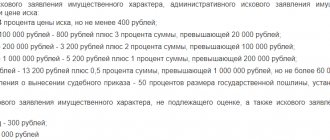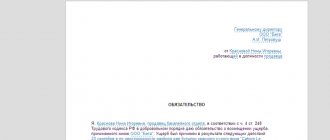Every employer may encounter lack of qualifications, negligence, or simply frivolity of an employee, which may result in material losses for the employer. Moreover, the violation may not necessarily involve causing direct damage to the employer’s property. It is possible to recover material damages for violation of labor discipline as such.
There are ways to pre-trial resolve a conflict situation, but the employee does not always meet the employer halfway. Therefore, sometimes the employer has to file a claim and the proceedings develop into litigation. In this regard, the employer needs to approach the preparation and filing of the claim extremely carefully, since in case of any violations on his part, the court may side with the employee.
Drawing up a statement of claim for recovery of material damage
If it was not possible to resolve the conflict with the employee pre-trial, then the time comes for litigation. In the claim, the plaintiff indicates how the material damage was caused and what specific property it was caused, or what costs the employer incurred due to the employee’s misconduct.
The employer's evidence base can be witness testimony, expert opinions, circumstances of damage or other documented facts of the employee's guilt.
When filing a claim, the employer must attach a copy of the employment contract to the claim.
The statement of claim must be made in writing, by hand or using a computer. The contents of the claim must include:
- full name and location of the court;
- indication of the details of the plaintiff and defendant;
- subject of the application;
- grounds for filing a claim;
- cost of claim;
- data on attempts to resolve the conflict pre-trially;
- personal signature of the plaintiff and seal of the organization.
Indication of the claim price is a mandatory condition. It is quite difficult to calculate the amount of damage caused on your own, therefore, when drawing up a claim, it is better to seek help from specialist appraisers.
Civil claim for compensation for damage caused by a crime (Article 131 of the Criminal Code of the Russian Federation)
STATEMENT OF CLAIM
on recovery of moral damage caused by a crime, compensation for material damage from a crime
The Khoroshevsky District Court of Moscow is prosecuting a criminal case accusing the defendant of committing crimes under Part 1 of Article 30, Part 1 of Article 131 of the Criminal Code of the Russian Federation, Part 1 of Article 132 of the Criminal Code of the Russian Federation, paragraph “d” of Part. 2 Article 161 of the Criminal Code of the Russian Federation.
As a result of the unlawful actions of the defendant, provided for in Part 1 of Article 30, Part 1 of Article 131 of the Criminal Code of the Russian Federation, Part 1 of Article 131 of the Criminal Code of the Russian Federation, Part 1 of Article 132 of the Criminal Code of the Russian Federation, Clause “g”, Part 2 of Art. 161 of the Criminal Code of the Russian Federation, I suffered property damage, my personal non-property right - the right to health - was violated, and I was also subjected to moral and physical suffering.
I. According to Article 151 of the Civil Code of the Russian Federation, if a citizen is caused moral harm by actions that violate his personal non-property rights or encroach on other intangible benefits belonging to the citizen, the court may impose on the violator the obligation of monetary compensation for this damage.
As the Supreme Court of the Russian Federation indicated in Resolution No. 10 of December 20, 1994, “Some issues of application of legislation on compensation for moral harm,” moral harm is understood as moral or physical suffering caused by actions (inaction) encroaching on what belongs to a citizen from birth or by force of law intangible benefits, either violating his personal non-property rights, or violating the property rights of a citizen. In this case, moral harm may consist, in particular, in moral feelings in connection with physical pain associated with injury or other damage to health, in connection with a disease suffered as a result of moral suffering, etc.
According to the law, the amount of compensation for moral damage depends on the nature and extent of moral or physical suffering caused to the plaintiff, the degree of guilt of the defendant in each specific case, and other noteworthy circumstances, subject to the requirements of reasonableness and fairness. In this regard, a sign of compensation for moral damage is the focus on receiving a sum of money to create positive emotions in a person that would completely or partially extinguish the effect on the psyche of previously suffered suffering. The claim for compensation for moral damage is not related to unfavorable changes in the property status of a citizen and is not aimed at restoring it.
The physical suffering inflicted on me was expressed in the consequences of a closed craniocerebral injury inflicted on me by the defendant in the form of a concussion, namely: periodic headaches, surges in blood pressure, for which I had to undergo treatment from a neurologist. Along with this, I experienced pain in the places of bruises of the right shoulder, left shoulder, right forearm, left shoulder blade area, right hip, left thigh, in the area of the knee joints, left shin, as well as in the upper-inner quadrants of both mammary glands. The fact that the indicated bodily injuries were caused to me was established by the conclusion of a forensic medical examination conducted as part of a criminal case (expert report No. 860-g dated October 31, 2014).
The moral suffering inflicted on me was expressed in the fact that I developed a feeling of disappointment in relation to the world around me, a loss of confidence in the future, and feelings of anxiety and fear for the life and safety of me and my relatives. After the violent acts committed against me by the defendant, I developed a persistent state of anxiety and insomnia. At the moment when the defendant committed illegal actions towards me, I experienced feelings of humiliation, helplessness and shame that haunt me to this day.
I believe that the amount of compensation for moral damage should be sufficient to ensure that the resulting feelings of disappointment and mental suffering are at least partially eliminated. I estimate the moral damage caused to me by the defendant in the amount of 200,000 rubles.
II. In accordance with Part 1 of Article 1064 of the Civil Code of the Russian Federation, harm caused to the person or property of a citizen is subject to compensation in full by the person who caused the harm.
The criminal actions of the defendant caused me material damage , expressed in the loss of my Samsung mobile phone worth 25,000 rubles.
Based on the above and in accordance with Art. 44 of the Criminal Procedure Code of the Russian Federation, Art. 151, 1064 of the Civil Code of the Russian Federation,
ASK:
- Recognize me as a civil plaintiff in a criminal case.
- To recover from the defendant in my favor funds in the amount of 2,000,000 rubles. for compensation for moral damage
- To recover from the defendant in my favor funds in the amount of 25,000 rubles. for compensation for material damage
Filing a claim for compensation for material damage
The place where a claim is filed is primarily determined by its cost. So, if the price of the claim is more than 50 thousand rubles, then the applicant applies to the district court at the place of residence of the defendant. If it is less than this amount, then the magistrate will consider the case.
The employer can file a claim against the employee no later than one year from the date of the damage.
An application to the court can be submitted by the plaintiff either in person, through an authorized representative or by mail. The main thing is to pay the state fee before filing and attach the corresponding receipt to the documentation attached to the claim. The amount of the state fee depends on the amount of the claim. You can calculate it on the official website of the Supreme Court. Pay - at a bank, post office or any other authority that accepts payments.
If the applicant presents compelling arguments and evidence confirming the employee’s guilt, the court will side with the plaintiff. However, the law provides for a number of situations in which an employee will be exempt from compensation for damage.
Thus, an employee is exempt from payments if:
- the damage was caused by unforeseen events that were beyond the control of the employee;
- an attempt to eliminate problems that caused damage threatened the life of the employee;
- the damage was caused by self-defense;
- material damage was partially or completely caused by the actions of the employer;
- the employee was released from liability by the employer.
Among other things, the court will exempt the employee from compensation for damage if the harm caused to the employer was the result of an ordinary economic risk or due to the emergence of production or technological innovations for which the employee was not properly prepared.
Legal basis for collecting money for damage caused
From the point of view of legislation, damage is considered as a type of loss that the injured person has the right to demand from the culprit. The Civil Code of the Russian Federation defines this concept in paragraph 2 of Art. 15. The concept of damage includes:
1) Direct loss, damage or reduction of property (by damage we mean the occurrence of defects that led to a decrease in the value of material objects).
2) Expenses that the victim is forced to bear to restore the violated right, that is, to return to the original situation. This means that the culprit is obliged to compensate not only the cost of the property that he lost or damaged, but also the additional expenses of the plaintiff that arose in connection with this (for example, payment of bank commissions for money transfers, examinations in courts, transport services, etc.).
An important point: the legislator, when mentioning compensation for expenses incurred by the injured party, takes into account not only those already incurred at the time the statement of claim was submitted to the court, but also future ones.
Both damage to property (loss, damage, reduction in its value) and the costs incurred in connection with this to restore the status quo (return to the original state) are called real damage by the legislator. The concept of “reality” was introduced to distinguish it from the concept of lost profits - another type of loss. It should be emphasized that the expenses incurred by the injured party to restore the violated right belong precisely to the category of real damage.
Sample statement of claim for compensation for material damage
Drawing up a claim begins with a header, which indicates all the necessary information about the court to which the application is being submitted, the plaintiff and the defendant. Next comes the main part, which indicates the grounds for filing a claim, describes the damage suffered by the employer due to the employee’s misconduct, and provides evidence of the employee’s guilt.
The main part is followed by the employer’s requirements and a list of documentation attached to the claim. Finally, the date of filing the claim, the personal signature of the plaintiff and the seal of the organization.
A template form of claim may not always be suitable for a specific case, therefore, when going to court, it is worth contacting lawyers who will help you draw up a competent statement and achieve a positive outcome of the trial for the employer.
- Order an independent damage assessment
- Assistance from lawyers in collecting damages from employees
A civil plaintiff has the right:
- support a civil claim;
- present evidence;
- give explanations regarding the claim;
- file petitions and challenges;
- give evidence and explanations in his native language or a language he speaks;
- use the help of a translator for free;
- refuse to testify against yourself, your spouse and other close relatives, the circle of whom is defined by paragraph 4 of Article 5 of the Criminal Procedure Code. If a civil plaintiff agrees to testify, he must be warned that his testimony may be used as evidence in a criminal case, including in the event of his subsequent refusal to testify;
- have a representative;
- get acquainted with the protocols of investigative actions carried out with his participation;
- participate, with the permission of the investigator or inquiry officer, in investigative actions carried out at his request or at the request of his representative;
- abandon the civil claim brought against them. Before accepting the refusal of a civil claim, the inquirer, investigator, court explains to the civil plaintiff the consequences of abandoning a civil claim, provided for in part five of this article;
- at the end of the investigation, get acquainted with the materials of the criminal case related to the civil claim brought against him, and write out any information and in any volume from the criminal case;
- know about decisions made that affect his interests and receive copies of procedural decisions related to the civil claim brought against him;
- participate in the trial of a criminal case in the courts of the first, second, cassation and supervisory instances;
- speak in court arguments to substantiate a civil claim;
- get acquainted with the minutes of the court hearing and submit comments on it;
- file complaints against the actions (inaction) and decisions of the inquirer, investigator, prosecutor and court;
- appeal the verdict, ruling and ruling of the court insofar as it relates to the civil claim;
- know about the complaints and representations brought in the criminal case and file objections to them;
- participate in the judicial consideration of complaints and submissions brought in the manner prescribed by this Code.
A waiver of a civil claim may be declared by a civil plaintiff at any time during the criminal proceedings, but before the court retires to the deliberation room to render a verdict. Refusal of a civil claim entails the termination of proceedings on it.
The civil plaintiff does not have the right to disclose the data of the preliminary investigation if he was warned about this in advance in the manner prescribed by Article 161 of the Criminal Procedure Code. For the disclosure of preliminary investigation data, the civil plaintiff is liable in accordance with Article 310 of the Criminal Code of the Russian Federation.
See another example of a statement of claim...
The procedure for compensation for material damage from the actions of a criminal
First you need to calculate its amount. This can be done either on the basis of an expert opinion or by calculating all expenses supported by documents.
In addition, compensation for damage caused by a crime also applies to compensation for moral damage in an accident. Here the victim or his relatives are free to determine the amount themselves. Moreover, moral damage in a crime is compensated regardless of the presence of guilt.
After the victim or his relatives have determined the amount of damage due to the theft, it is necessary to prepare a civil claim. It is addressed either to the investigator or to the court that is considering the criminal case. As a result, the amount awarded for recovery from the civil defendant will appear in the verdict as separate items.
Arbitrage practice
Consideration of claims for compensation for damage resulting from a crime does not cause any difficulties for the courts. Especially when the amount of damage is included in the sentence against the convicted person.
It's not just victims who come forward with statements. The initiator of the trial may be the victim’s relatives, as well as the prosecutor. He acts in the interests of the state.
Some sample solutions may be helpful or cause for thought. Below is a description of several such cases. All names mentioned are fictitious.
Regression payments for health insurance
When a victim has suffered health damage as a result of a crime, payment for his treatment can be made from the funds of the Compulsory Medical Insurance Fund. In the future, the money is recovered from the convicted person by way of recourse.
We recommend! Compensation for damage caused to a citizen’s property, step-by-step algorithm of actions + sample statement of claim for compensation for material damage
As an example, we can cite the decision of the Metallurgical District Court of Chelyabinsk dated January 30, 2019 in case No. 2-146/2019. The prosecutor, on behalf of the MHIF department, appealed to citizen Titova with a claim to recover 56 thousand rubles.
The court verdict established that during a quarrel Titova inflicted serious bodily injuries on her daughter. The specified amount was spent on the treatment of the victim, which the court subsequently recovered from Titova.
Recovery of damages from fraud
Citizen Fedorov approached the defendant, Zinoviev, with a claim for the recovery of 540 thousand rubles as damage caused by fraud. Fedorov explained that Zinoviev entered into a fictitious agreement with him to renovate the apartment and received the above-mentioned amount. Later it was spent on personal needs.
The fact of fraud was confirmed by the court verdict against Zinoviev that entered into force. The amount of damage caused to Fedorov was also indicated there.
As a result, the Zavolzhsky District Court of Yaroslavl, by decision dated January 30, 2019, in case No. 2-330/2019, satisfied Fedorov’s claim. Separately, it was stated that the amount of harm inflicted established by the verdict in a criminal case is not subject to further proof.
Reimbursement of taxes unpaid by the company
The illustrative case was considered by the Sovetsky District Court of Bryansk. The prosecutor filed a lawsuit in the interests of the state to recover 9 million rubles from citizen Dolgov for budget revenue.
The requirements are justified by the fact that Sirius LLC, of which the defendant was a director, during 2012-2013. failed to pay taxes for the specified amount due to the submission of false declarations to the Federal Tax Service. Meanwhile, no criminal case was initiated against Dolgov due to the expiration of the statute of limitations.
The defendant objected to the claim, citing the fact that Sirius LLC was declared bankrupt and all creditors' claims were considered settled. In addition, the statute of limitations for unpaid taxes has passed.
Meanwhile, by the decision of January 30, 2019 in case No. 2-434/2019, the prosecutor’s demands were satisfied. The court considered that it was Dolgov’s actions that caused damage to the state. At the same time, the judge considered that the statute of limitations had not expired, since three more years had not passed since the decision was made to refuse to initiate a criminal case.
Contents of a claim to an employee for damages and its sample
Since the law does not mention the type of document in question, there are no requirements for its content. Typically the claim contains:
- information about the employer;
- Full name and address of the employee;
- a brief description of the situation that resulted in the damage;
- the results of the investigation and a link to documents confirming them;
- proposal for voluntary compensation for damage;
- the period within which it is proposed to compensate for the damage/give a response/appear to the employer for negotiations;
- an indication of the employer's intention to go to court;
- Full name and signature of an authorized person (head of an organization, entrepreneur, other person by proxy).
Documents that document the results of the investigation can be attached to the complaint.
The claim must be handed to the employee against signature, and if this is not possible, it must be sent by mail to the address specified in the employment contract. To confirm sending, the letter is prepared with a notification and a description of the attachment.








